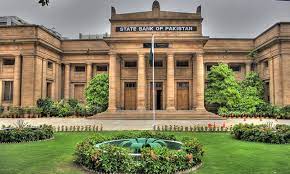PTBP Web Desk
The State Bank of Pakistan (SBP) announced on Tuesday the removal of the Minimum Profit Rate (MPR) requirement for all conventional banks on deposits from financial institutions, public sector enterprises, and public limited companies.
This decision, which takes effect from January 1, 2025, marks a pivotal change in banking regulations aimed at providing flexibility to banks while potentially reshaping corporate deposit strategies.
The MPR requirement was introduced in September 2013, becoming effective on October 1 of the same year. Under this directive, commercial banks were mandated to pay a Minimum Profit Rate on all Pakistani Rupee (PKR) savings deposits, calculated as 50 basis points below the prevailing SBP Repo Rate (Interest Rate Corridor – Floor). Any changes in the Repo Rate were automatically reflected in the profit rates applicable from the first day of the following month.
This policy applied uniformly to both existing and new savings deposits, including term deposits, with the profit rate calculated on average monthly balances. While the directive ensured consistent returns for deposit holders, it imposed a fixed cost on banks, limiting their ability to negotiate rates, especially with large corporate clients.
With the removal of the MPR requirement, banks will no longer be obligated to offer fixed profit rates on deposits from financial institutions, public sector enterprises, and public limited companies. Instead, profit rates will be determined through direct negotiations between banks and their corporate clients.
According to the circular issued by the SBP, this policy adjustment is designed to facilitate banks by granting them greater operational flexibility. The directive states, “The Minimum Profit Rate requirement shall not be applicable on the deposits of financial institutions, public sector enterprises, and public limited companies.”
This policy change is expected to benefit banks with a higher proportion of corporate deposits, as they are no longer required to pay a mandated minimum profit rate on large deposit volumes. As per analysts, this move provides a notable advantage to banks with a significant mix of corporate clients in their deposit portfolios.
Data from the 2023 annual accounts of all listed banks in Pakistan reveal that total deposits stand at approximately PKR 27 trillion, with 53% (around PKR 14 trillion) comprising corporate deposits. Conventional banks with a higher mix of corporate deposits are likely to experience the most significant impact. These include:
- Bank of Punjab (BOP)
- Bank of Khyber (BOK)
- Samba Bank (SBL)
- National Bank (NBP)
- Askari Bank (AKBL)
These banks have corporate deposit exposures ranging between 65% and 88%. Meanwhile, other major players such as MCB Bank (MCB), Bank Al Habib (BAHL), Habib Bank (HBL), and United Bank (UBL) have corporate deposit exposures in the range of 35% to 40%.
Financial analysts have highlighted the potential earnings boost for banks as a result of reduced deposit costs. Initial estimates suggest that banks could see a 7% increase in earnings on average with a 50 basis point reduction in deposit costs. However, the competitive environment within the banking sector may limit the extent to which profit rates can be lowered, as banks risk losing deposits to alternative investment options, such as Treasury Bills (T-bills).
Topline analysts believe that while the policy offers immediate benefits, it also poses challenges. “Banks must carefully navigate the competitive dynamics to retain corporate deposits while optimizing profit margins,” they noted. The shift to negotiated rates underscores the importance of maintaining strong client relationships and offering attractive financial products.
The removal of the MPR requirement aligns with broader trends in banking deregulation, promoting market-driven rate mechanisms. By granting banks the freedom to negotiate rates, the SBP aims to enhance operational efficiency and foster a more competitive banking landscape.
For corporate depositors, the move represents a shift towards customized banking solutions. While this may offer opportunities for better returns in some cases, it also places greater responsibility on corporate entities to negotiate favorable terms.




